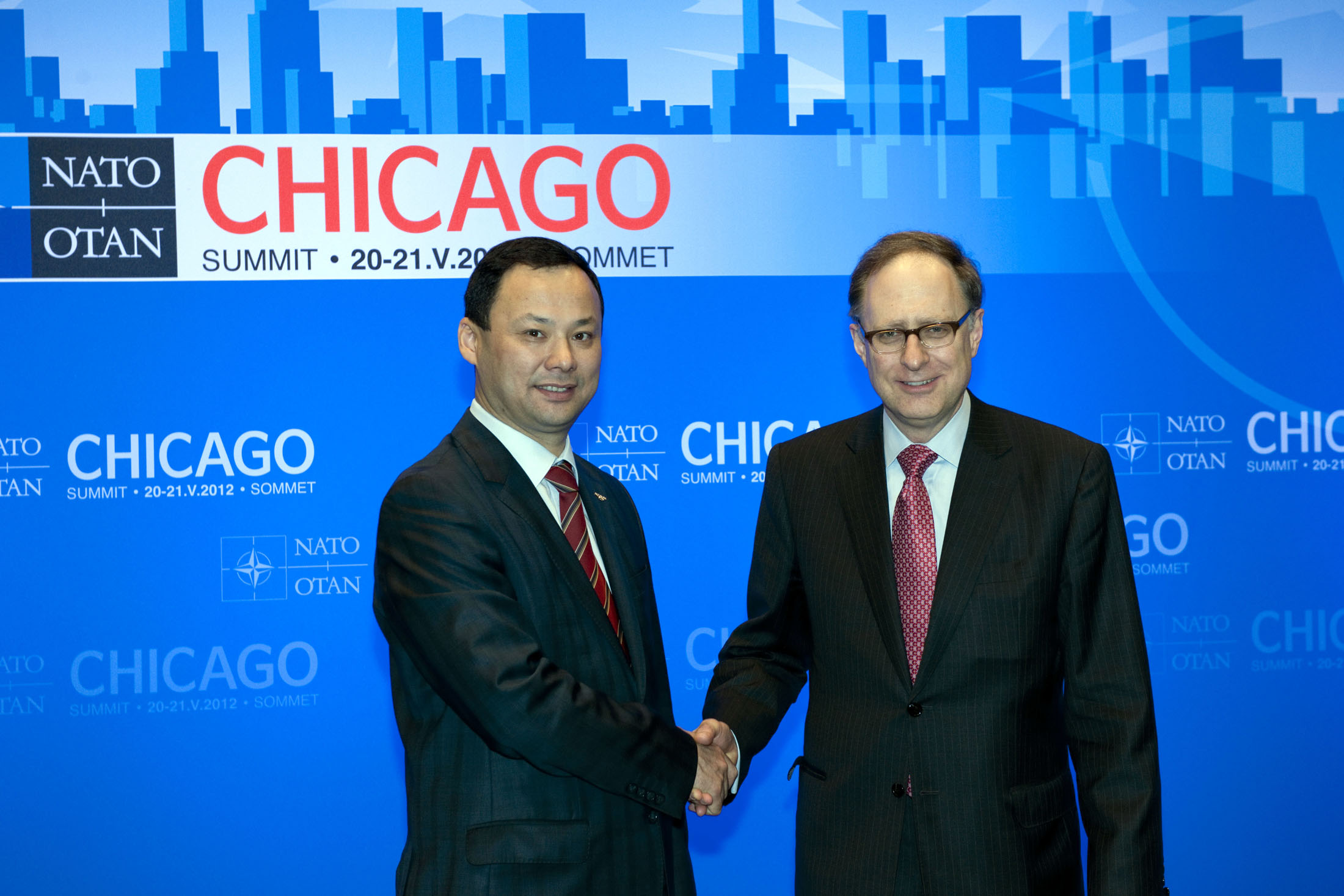
Kyrgyzstan Signs NATO Reverse Transit Agreement
Publication: Eurasia Daily Monitor Volume: 9 Issue: 106
By:

On May 22, during the NATO Summit in Chicago, Kyrgyzstan’s Foreign Minister Ruslan Kazakbaev and NATO Deputy Secretary General Alexander Vershbow signed an agreement on ground transport routes for the International Security Assistance Force (ISAF), allowing the country to actively support the complex drawdown of Alliance forces from Afghanistan. Kyrgyzstan’s foreign ministry believes that the new accord with NATO is not only in the interest of stabilizing Afghanistan, but will also contribute to the future security of Central Asia (Interfax, May 23).
Bishkek’s deepening partnership with NATO on Afghanistan, particularly in relation to the Northern Distribution Network (NDN), is matched by similar interest at the bilateral level with key Alliance members. The Kyrgyzstani government wants NATO members to support the latest drive to reform and modernize its Armed Forces. However, there are signs that these arrangements will persist long after the symbolic completion date of 2014 for the NATO drawdown in Afghanistan. Kyrgyz President Almazbek Atambayev, widely regarded before his election to the presidency as pro-Russian, made clear in an interview on May 24 that Bishkek will continue to support the transportation of cargo to Afghanistan after 2014. Although denying rumors that the issue of the US Transit Center at Manas was discussed on the sidelines of the NATO summit, there are clear indications that Atambayev has no intention of closing the facility following the NATO withdrawal in 2014 (Interfax, May 24).
In Nezavisimaya Gazeta, Viktoriya Panfilova explained that Kyrgyzstan has now formally agreed to participate in the reverse transit of non-lethal equipment in the NDN to assist in the Alliance’s withdrawal. “The new agreement attests to the continuation of NATO’s policy toward the countries of the region: cooperation is expanding. It is important that this is happening with the virtual approval of the Russian Federation, for the Alliance has gotten the opportunity to create a transshipment center in Ulyanovsk for freight transit,” Ravshan Jeenbekov, Kyrgyzstani parliamentary deputy and leader of the Democratic Alliance Party, explained. Jeenbekov added that until the agreement was signed in Chicago, Bishkek had limited its assistance to opening its airspace and retaining the Transit Center at Manas (Nezavisimaya Gazeta, May 30).
Panfilova connected the Moscow-Washington axis and the deepening level of cooperation marked by such NATO agreements with a Central Asian state to ongoing differences between the United States and Pakistan. The weakening of the Pakistani Ground Lines of Communication (GLOC) had forced Washington to realign its policy in this area toward Russia and the Central Asian states. Panfilova stated that Washington had made an unsuccessful overture to Islamabad during the NATO Summit in Chicago, aimed at resolving issues over the GLOC, but was rebuffed by Pakistan’s request of a public apology for the US military killing its servicemen, a revision of US policy on air attacks using UAVs, and an increase in transit fees per vehicle from $250 to $5,000. President Barack Obama had refused to meet Pakistan’s President Asif Ali Zardari at the summit one-on-one (meeting instead in a trilateral format together with Afghan President Hamid Karzai) and chose to publicly thank Russian and Central Asian countries for their support on Afghanistan (Nezavisimaya Gazeta, May 30).
Jeenbekov also linked the Kyrgyzstani President’s eagerness to enter the reverse transit route agreement with NATO to the ongoing budget deficit, currently estimated at around 17 billion Som ($361 million). Economists forecast a tougher year ahead, and consequently Bishkek needs foreign support from Russia and other partners. Jeenbekov added that having signed the surface transit agreement with NATO, the US Transit Center will most likely remain open beyond 2014. “If the authorities had decided to close down the Transit Center, they probably ought not to have signed the new agreement in Chicago. This is indirect evidence that the Transit Center will stay,” Jeenbekov explained (Nezavisamaya Gazeta, May 30).
Moscow’s willingness to assist in the NATO drawdown through its participation in overland routes for the transportation of non-lethal equipment may indicate that a new alignment is occurring in Washington’s and Moscow’s conduct of policy in Central Asia. The US cannot secure the active participation of Russia’s closest allies in the changes needed in the use of the NDN without Moscow’s cooperation, and all these routes would collapse without Russian involvement. Whether this will presage wider and closer defense and security coordination or cooperation between Washington and Moscow in Central Asia remains to be seen, since the NDN has a limited shelf life. Panfilova was blind to the fact that NATO’s real interest in using the NDN to support the withdrawal relates to reducing costs (Interfax, May 26).
There are additional factors driving Atambayev’s interest in cooperating with NATO. Atambayev understands that the latest effort to reform the Kyrgyz Armed Forces will require foreign assistance. To facilitate such help and secure donors for the modernization process, Atambayev may well offer up Kyrgyzstan’s territory to new transit agreements with NATO (AKIpress, May 29). On May 27, celebrating the twentieth anniversary of the Kyrgyz Armed Forces, Defense Minister Taalaybek Omuraliyev promised a more concerted effort to raise the social prestige of the armed forces and to target dedovshchina (hazing of new recruits by older soldiers) (Interfax, May 28). Addressing these issues will open Bishkek to more carefully explore existing and developing western programs of assistance designed to build defense capacity and improve standards among personnel.
According to Omuraliyev, 70 percent of the Armed Forces is manned by contract personnel, with the remainder drawn from conscription; standards among the contract personnel will need to improve alongside introducing modern weapons and equipment. Thus, Bishkek faces the prospect of long term reform in its Armed Forces, which is in the interest of the region’s security and may result in reducing its dependence on other actors’ practical support during times of national crises – as occurred in southern Kyrgyzstan in June 2010 (Interfax, May 28).
As the NATO withdrawal proceeds in Afghanistan, both the Alliance and key members will encourage Central Asian states to assume more responsibility for providing their own security. But such a task is enormous in Kyrgyzstan – exposed so potently by the inability of the defense and security forces in June 2010 to cope with ethnic clashes in the southern part of the country. That weakness, despite its involvement in NATO and member states’ defense assistance programs, left no choice but to appeal to Moscow for military intervention. Consequently, the price attached to another failed reform cycle may prove to be high.




